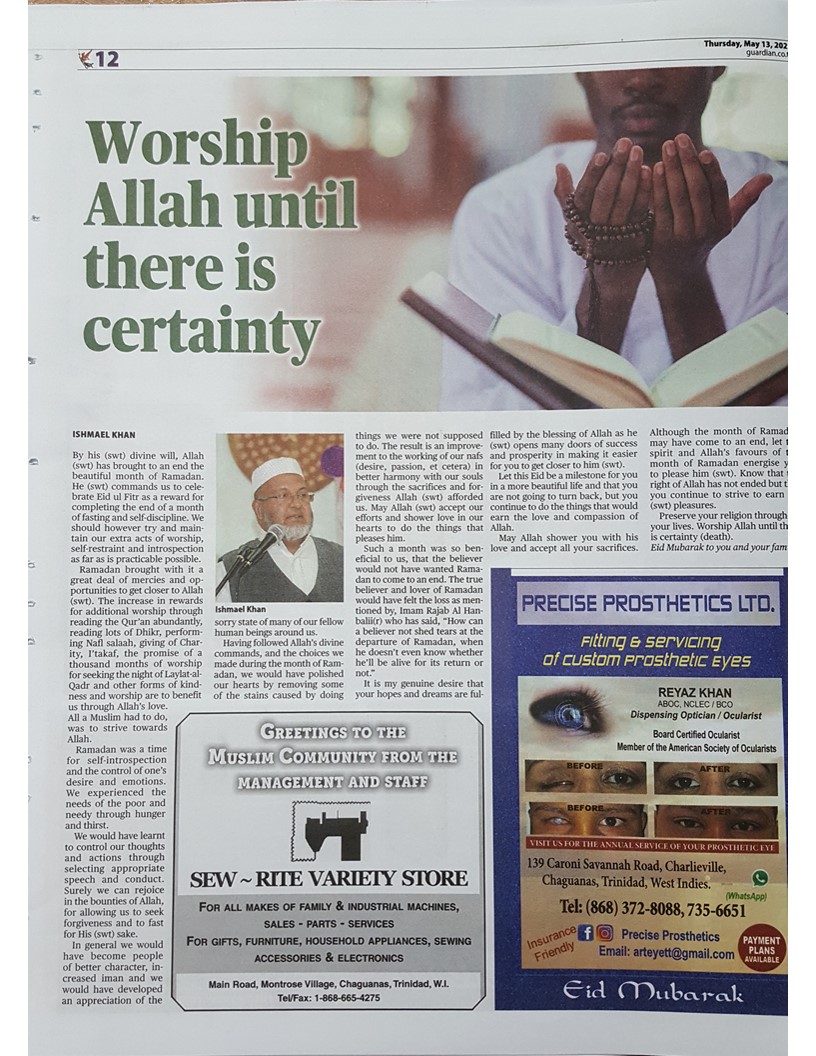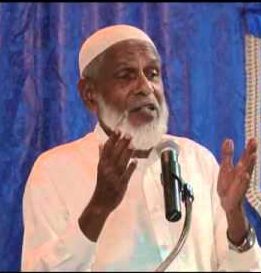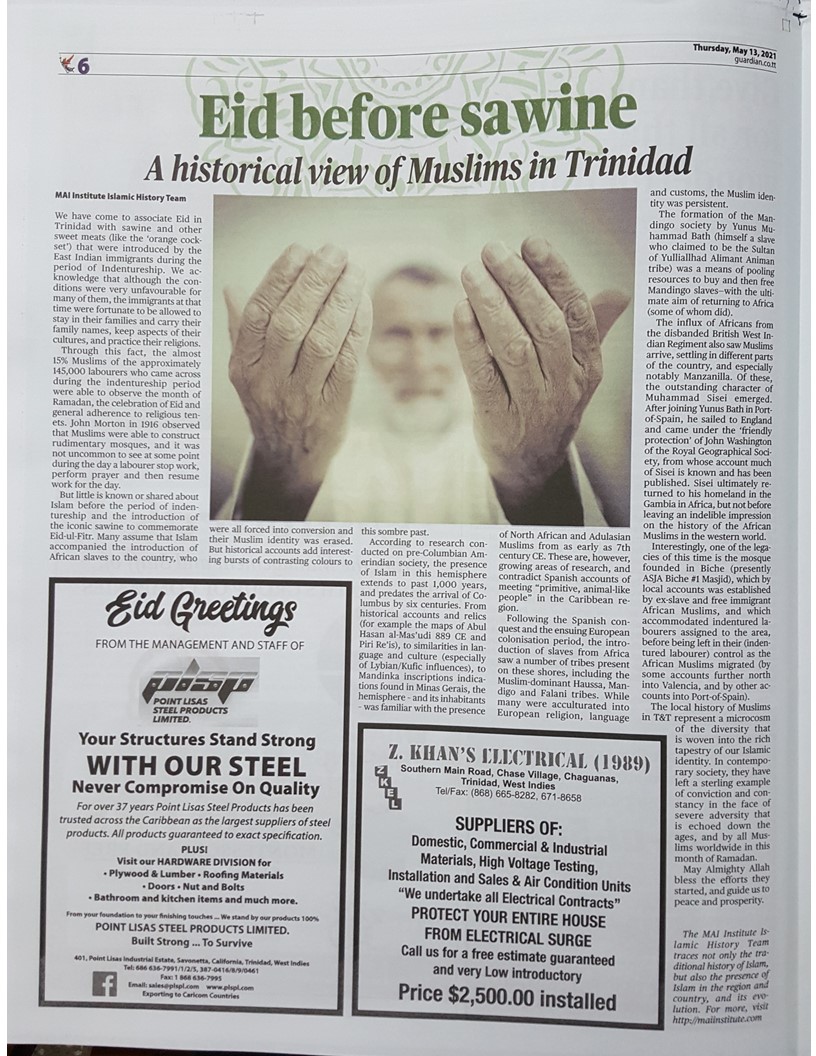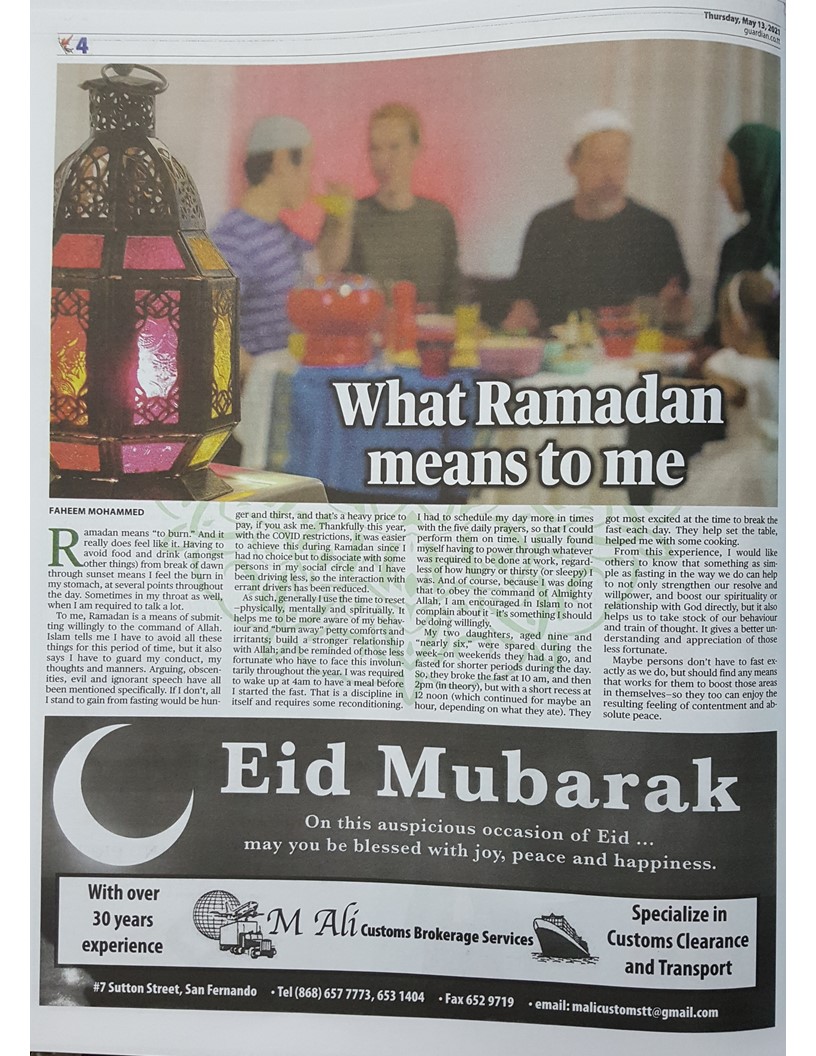Monthly Archives: June 2021

Worship Allah until there is Certainty
Haji Ishmael Khan
By His (swt) divine will, Allah (swt) has brought to an end the beautiful month of Ramadhaan. He (swt) commands us to celebrate Eid ul Fitr as a reward for completing the end of a month of fasting and self-discipline. We should however try and maintain our extra acts of worship, self-restraint and introspection as far as is practicable possible.
Ramadhaan brought with it a great deal of mercies and opportunities to get closer to Allah (swt). The increase in rewards for additional worship through reading the Qur’an abundantly, reading lots of Dhikr, performing Nafl salaah, giving of Charity, I’takaf, the promise of a thousand months of worship for seeking the night of Laylat-al- Qadr and other forms of kindness and worship are to benefit us through Allah’s love . All a Muslim had to do , was to strive towards Allah.
Ramadhaan was a time for self-introspection and the control of one’s desire and emotions. We experienced the needs of the poor and needy through hunger and thirst. We would have learnt to control our thoughts and actions through selecting appropriate speech and conduct. Surely we can rejoice in the bounties of Allah, for allowing us to seek forgiveness and too fast for His (swt) sake. In general we would have become a person of better character, increased iman and we would have develop an appreciation of the sorry state of many of fellow human being around us.
Having followed Allah’s divine commands, and the choices we made during the month of Ramadhaan, we would have polished our hearts by removing some of the stains caused by doing things we were not supposed to do. The result is an improvement to the working of our nafs (desire, passion, etc.) in better harmony with our souls through the sacrifices and forgiveness Allah (swt) afforded us. May Allah (swt) accept our efforts and shower love in our hearts to do the things that pleases him.
Such a month was so beneficial to us, that the believer would not have wanted Ramadhaan to come to an end. The true believer and lover of Ramadhaan would have felt the loss as mention by, Imam Rajab Al Hanbalii (r ) who has said, “How can a believer not shed tears at the departure of Ramadhaan, when he doesn’t even know whether he’ll be alive for its return or not”. It is my genuine desire that your hopes and dreams are fulfill by the blessing of Allah as He (swt) open many doors of success and prosperity in making it easier for you to get closer to Him (swt).

Let this Eid be a milestone for you in a more beautiful life; and that you are not going to turn back, but you continue to do the things that would earn the love and compassion of Allah.
May Allah shower you with His love and accept all your sacrifices. Although the month of Ramadhaan may have come to an end, let the spirit and Allah’s favors of the month of ramadhaan energize you to please Him (swt). Know that the right of Allah has not ended but that you continue to strive to earn His (swt) pleasures. Preserve your religion throughout your lives. Worship Allah until there is certainty (death).
EID MUBARAK TO YOU AND YOUR FAMILY.

Making the Right Choices
Maulana Dr. Waffie Mohammed
Praises are for Allah, the Originator of the skies and the earth. He created everything from nothing. He alone is the All-Knowing, the All-Wise. Allah is the Lord of Mercy. He says that His mercy encompasses everything. As the Creator, He says that no creature can be like Him.
The human being is a special creation of the Lord. He gave man the capability and capacity to represent Him here on the earth. On one hand, man can behave like the Lord in many ways. For example, man can show love, kindness, compassion, forgiveness, etc. And on the other, hand man is blessed with freedom to choose.
Out of His mercy and favor to man, the Lord sent Messengers to all of mankind wherever they would have been living on the earth. Each Messenger had the mission to teach the people what choices they were to make along the journey of life.
The best model that the Lord gave to the whole world was the life of His final Messenger, Prophet Muhammad (peace be on him). The Lord says about him, “And We have not sent thee (O Muhammad) but as a universal model to mankind.”
Complete representation of the Lord here on the earth was given to mankind with the best lifestyle of Prophet Muhammad (peace be on him) and the complete and perfect code with the Lord’s unadulterated words that He undertook to preserve, in the book called the Holy Quran.
Muslims know that life in this world is for a short span of time, but if properly managed and the correct choices are made all along the journey, the individual is assured of eternal bliss in the Hereafter. The principles of Islam are five. Each one, when properly upheld, helps the individual to know that he is a traveller towards a destination, and should not become attached to the material universe.
Fasting is one of the five principles. The others are belief in the Oneness of God, worship, zakat (charity) and pilgrimage to Makkah once in a lifetime, if one can afford it. Each of the fundamental principles of Islam helps the individual to understand that material life is just for a time, but it can be used to benefit the individual positively on the rest of the journey. So, each individual is required to humbly submit to the way of life given to us all by the Lord. This way of life is called Islam.
While a person is required to submit humbly to what the Lord says is best for us, the cursed one – Satan – makes every effort to discourage the human being from upholding what will be of benefit to him or her on the next phase of the journey. So many people become forgetful and leave behind only material things which have no value to them as they continue on the journey.
The month of fasting strengthens the conscientiousness of the individual to make the right choices all along the journey. Perhaps this is the reason why the Lord says, “If you keep the fast, it is better for you.” We thank Allah for favoring us to be able to witness the month of Ramadan, and to be blessed to be able to keep the fast.
May the Almighty Lord guide us to make the correct choices in this part of our journey, and strengthen our resolve and firmness to follow the path, in this month of Ramadan.

EID BEFORE SAWINE: A HISTORICAL VIEW OF MUSLIMS IN TRINIDAD
MAI Institute Islamic History Team: We have come to associate Eid in Trinidad with sawine and other sweet meats (like the ‘orange cockset’) that were introduced by the East Indian immigrants during the period of Indentureship. We acknowledge that although the conditions were very unfavorable for many of them, the immigrants at that time were fortunate to be allowed to stay in their families and carry their family names, keep aspects of their cultures, and practice their religions. Through this fact, the almost 15% Muslims of the approximately 145,000 labourers who came across during the indentureship period were able observe the month of Ramadan, the celebration of Eid and general adherence to religious tenets. John Morton in 1916 observed that Muslims were able to construct rudimentary mosques, and it was not uncommon to see at some point during the day a labourer stop work, perform prayer and then resume work for the day.
But little is known or shared about Islam before the period of indentureship and their introduction of the iconic sawine to commemorate Eid-ul-Fitr. Many assume that Islam accompanied the introduction of African slaves to the country, who were all forced into conversion and their Muslim identity was erased. But historical accounts add interesting bursts of contrasting colors to this sombre past.
According to research conducted on pre-Columbian Amerindian society, the presence of Islam in this hemisphere extends to past 1000 years, and predates the arrival of Columbus by 6 centuries. From historical accounts and relics (for example the maps of Abul Hasan al-Mas’udi 889 C.E. and Piri Re’is), to similarities in language and culture (especially of Lybian/Kufic influences), to Mandinka inscriptions indications found in Minas Gerais, the hemisphere – and its inhabitants – was familiar with the presence of North African and Adulasian Muslims from as early as 7th century CE. These are, however, growing areas of research, and contradict Spanish accounts of meeting “primitive, animal-like people” in the Caribbean region.
Following the Spanish conquest and the ensuing European colonization period, the introduction of slaves from Africa saw a number of tribes present on these shores, including the Muslim-dominant Haussa, Mandigo and Falani tribes. While many were acculturated into European religion, language and customs, the Muslim identity was persistent.
The formation of the Mandingo society by Yunus Muhammad Bath (himself a slave who claimed to be the Sultan of Yulliallhad Alimant Animan tribe) was a means of pooling resources to buy and then free Mandingo slaves – with the ultimate aim of returning to Africa (some of whom did).
The influx of Africans from the disbanded British West Indian Regiment also saw Muslims arrive, settling in different part of the country, and especially notably Manzanilla. Of these, the outstanding character of Muhammad Sisei emerged. After joining Yunus Bath in Port of Spain, he sailed to England and came under the ‘friendly protection’ of John Washington of the Royal Geographical Society, from whose account much of Sisei is known and has been published. Sisei ultimately returned to his homeland in the Gambia in Africa, but not before leaving an indelible impression on the history of the African Muslims in the western world.
Interestingly, one of the legacies of this time is the mosque founded in Biche (presently ASJA Biche #1 Masjid), which by local accounts was established by ex-slave and free immigrant African Muslims, and which accommodated indentured labourers assigned to the area, before being left in their (indentured labourer) control as the African Muslims migrated (by some accounts further north into Valencia, and by other accounts into Port of Spain).
The local history of Muslims in Trinidad and Tobago represent a microcosm of the diversity that is woven into the rich tapestry of our Islamic identity. In contemporary society, they have left a sterling example of conviction and constancy in the face of severe adversity that is echoed down the ages, and by all Muslims worldwide in this month of Ramadan. May Almighty Allah bless the efforts they started, and guide us to peace and prosperity.
The MAI Institute Islamic History Team traces not only the traditional history of Islam, but also the presence of Islam in the region and country, and its evolution. For more, visit https://maiinstitute.com

What Ramadan Means to Me – Guardian
Ramadan means ‘to burn’. And it really does feel like it. Having to avoid food and drink (amongst other things) from break of dawn through sunset means I feel the burn in my stomach, at several points throughout the day. Sometimes in my throat as well, when I am required to talk a lot.
To me, Ramadan is a means of submitting willingly to the command of Allah. Islam tells me I have to avoid all these things for this period of time, but it also says I have to guard my conduct, my thoughts, manners. Arguing, obscenities, evil and ignorant speech have all been mentioned specifically. If I don’t, all I stand to gain from fasting would be hunger and thirst, and that’s a heavy price to pay, if you ask me. Thankfully this year, with the Covid restrictions, it’s easier to achieve this since I have no choice but to dissociate with some persons in my social circle for a while, and I am driving less, so the interaction with errant drivers is reduced.
As such, generally I use this time to reset – physically, mentally and spiritually. It helps me to in part be more aware of my behaviour and ‘burn away’ petty comforts and irritants; build a stronger relationship with Allah; and be reminded of those less fortunate who have to face this involuntarily throughout the year. I am required to wake up at 4 am to have a meal before I start the fast. That is a discipline in itself and requires some reconditioning. I strive to schedule my day more in times with the 5 daily prayer, so that I can perform these on time. I usually find myself having to power through whatever is required to be done at work, regardless of how hungry or thirsty (or sleepy) I am. And of course, because I am doing this to obey the command of Almighty Allah, I am encouraged in Islam to not complain about it – it’s something I should be doing willingly.
My 2 daughters, aged 9 and ‘nearly 6’, are usually spared during the week – on weekends they have a go, and fast for shorter periods during the day. So they break the fast at 10 am, and then 2 pm (in theory), but with a short recess at 12 noon (which can continue for maybe an hour, depending on what they are eating). They get most excited at the time to break the fast each day. They help set the table, maybe help me with some cooking (my wife doesn’t like me cooking nor the girls helping me, because it means she has a bigger mess to clean – we are limited to making pholouries only at this point), and of course not wanting to eating a single thing when it’s time to eat, because… kids.
From this experience, I would like others to know that something as simple as fasting in the way we do can helps to not only strengthen our resolve and willpower, and boost our spirituality or relationship with God directly, but also helps take stock of our behaviour and train of thought, and give a better understanding and appreciation of those less fortunate.
Maybe persons don’t have to fast exactly as we do, but should find any means that works for them to boost those areas in themselves – so they too can enjoy the resulting feeling of contentment and absolute peace.
Faheem Mohammed